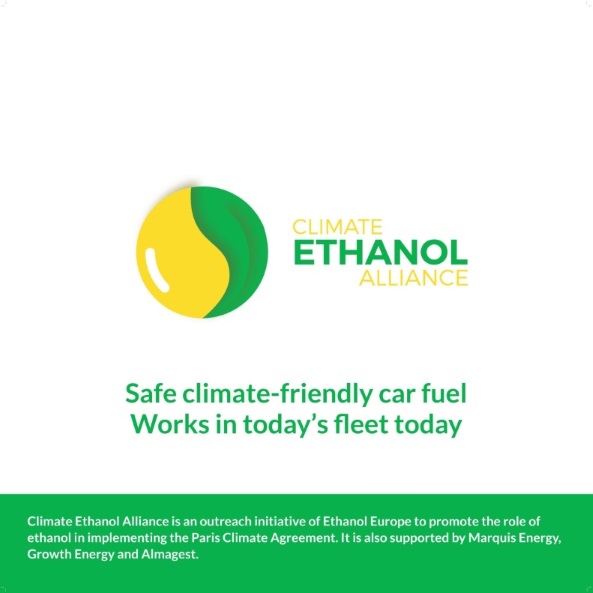
Ethanol Producers Work with UN to Accelerate Shift to Low Carbon
Date
Sections
EERL partners with UN Climate Change for COP 23
Press Release / 18. OCT, 2017
Share on facebook Share on twitter
Bonn, 18 October 2017 –Ahead of the UN Climate Conference in Bonn (COP 23, 6-17 November), Ethanol Europe Renewables Ltd (EERL) and UN Climate Change have partnered to boost the deployment of biofuels in the transport sector.
Transport is the second biggest source of energy-related greenhouse gas emissions world-wide, and the sector is rapidly growing. Biofuels such as ethanol have a much lower carbon footprint than fossil fuels, and can be added to gasoline to reduce emissions.
Nick Nuttall, Director of Communications and COP23 Spokesperson at UN Climate Change, said: “The world has embarked on an unprecedented journey to a sustainable and more secure future - how societies power-up their lives, from homes and businesses to transport and agriculture - will be crucial to success and partnerships of all kinds will be an indispensable catalyst for positive momentum”.
Ethanol Europe Renewables Ltd recently founded the Climate Ethanol Alliance, designed to bring together bioethanol producers for the promotion of climate action and the accelerated transition of the transport sector towards low carbon. Supporters of EERL’s initiative as a European ethanol producer are Marquis Energy, a leading US producer, Growth Energy a US ethanol trade association and Almagest a Bulgarian ethanol producer.
At COP23 in Bonn, EERL will present the biofuel industry’s efforts towards the transition to low carbon in a special exhibition and in a side event jointly organized by the partners.
Eric Sievers, Investment Director of EERL said: “Biofuels are a potential solution for decreasing the carbon footprint of the fleet of gasoline burning engines, which is large and still growing. Until the transition towards a global carbon neutral vehicle fleet is completed, bridge technologies such as ethanol can contribute to a decrease in emissions of the transport sector in a significant way, and we are looking forward to showcasing what is possible in Bonn.”
About Partnerships between UN Climate Change and non-Party stakeholders
The collaboration between UN Climate Change and EERL is part of a series of partnerships between UN Climate Change and relevant stakeholders, including the private sector, to support climate action. Partnerships will be formally recognized and given high visibility through the UN Climate Change website and social media channels, conference branding, and media engagement activities to reach a global audience.
The partnerships for COP 23 promote the increased involvement of non-Party stakeholders as foreseen in the Marrakesh Partnership for Global Climate Action (MPGCA).
The MPGCA was a launched at COP 22 by the Conference of the Parties, explicitly welcoming climate action of all non-Party stakeholders, including the private sector, to help implement the Paris Climate Change Agreement. All entities of society and business are strongly encouraged to scale up their efforts and support actions to reduce emissions, as well as to build resilience and decrease vulnerability to the adverse effects of climate change.
About UN Climate Change
With 197 Parties, the United Nations Framework Convention on Climate Change (UNFCCC) has near universal membership and is the parent treaty of the 2015 Paris Climate Change Agreement. The main aim of the Paris Agreement is to keep a global average temperature rise this century well below 2 degrees Celsius and to drive efforts to limit the temperature increase even further to 1.5 degrees Celsius above pre-industrial levels. The UNFCCC is also the parent treaty of the 1997 Kyoto Protocol. The ultimate objective of all agreements under the UNFCCC is to stabilize greenhouse gas concentrations in the atmosphere at a level that will prevent dangerous human interference with the climate system, in a time frame which allows ecosystems to adapt naturally and enables sustainable development.
About Ethanol Europe Renewables:
Ethanol Europe Renewables (EERL) operates Europe’s largest ethanol biorefinery through its subsidiary Pannonia Ethanol based in Hungary. The biorefinery is a multi-product facility focused on producing a wide variety of bioproducts from arable corn crops. Today it produces ethanol for liquid transport fuels, protein rich animal feed and corn oil. Bioproducts in the early stages of development or production include biochemicals, prebiotics, cellulosic ethanol, renewable replacement for plastic bottles, methane reducing cattle feed, prebiotics, fungal foods and algae fuels/chemicals. EERL is an Irish agribusiness company that commenced investment in renewables in 2010.
Media contacts:
Nick Nuttall, UN Climate Change Spokesperson: +49 152 0168 4831, nnuttall(at)unfccc.int
Joe Murray, Communications Director, EERL, 00 353 1 498030, jmurray(at)eerl.com
See also: http://unfccc.int
Follow UNFCCC on Twitter: @UNFCCC | español: @CMNUCC | francais: @CCNUCC
UNFCCC Executive Secretary Patricia Espinosa on Twitter: @PEspinosaC
UNFCCC on Facebook: facebook.com/UNclimatechange
UNFCCC on LinkedIn: UNFCCC
UNFCCC on Instagram: @UNFCCC

